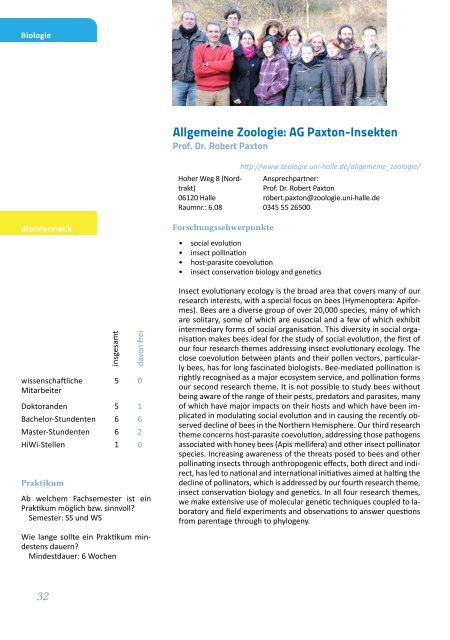Download - bei der Studentischen Förderinitiative eV!
Download - bei der Studentischen Förderinitiative eV!
Download - bei der Studentischen Förderinitiative eV!
Sie wollen auch ein ePaper? Erhöhen Sie die Reichweite Ihrer Titel.
YUMPU macht aus Druck-PDFs automatisch weboptimierte ePaper, die Google liebt.
Biologie<br />
Allgemeine Zoologie: AG Paxton-Insekten<br />
Prof. Dr. Robert Paxton<br />
Bioinformatik<br />
wissenschaftliche<br />
Mitar<strong>bei</strong>ter<br />
Doktoranden<br />
Bachelor-Stundenten<br />
Master-Stundenten<br />
HiWi-Stellen<br />
Praktikum<br />
insgesamt<br />
davon frei<br />
Ab welchem Fachsemester ist ein<br />
Praktikum möglich bzw. sinnvoll<br />
Semester: SS und WS<br />
Wie lange sollte ein Praktikum mindestens<br />
dauern<br />
Mindestdauer: 6 Wochen<br />
5<br />
5<br />
6<br />
6<br />
1<br />
0<br />
1<br />
6<br />
2<br />
0<br />
Hoher Weg 8 (Nordtrakt)<br />
06120 Halle<br />
Raumnr.: 6.08<br />
Forschungsschwerpunkte<br />
http://www.zoologie.uni-halle.de/allgemeine_zoologie/<br />
Ansprechpartner:<br />
Prof. Dr. Robert Paxton<br />
robert.paxton@zoologie.uni-halle.de<br />
0345 55 26500<br />
• social evolution<br />
• insect pollination<br />
• host-parasite coevolution<br />
• insect conservation biology and genetics<br />
Insect evolutionary ecology is the broad area that covers many of our<br />
research interests, with a special focus on bees (Hymenoptera: Apiformes).<br />
Bees are a diverse group of over 20,000 species, many of which<br />
are solitary, some of which are eusocial and a few of which exhibit<br />
intermediary forms of social organisation. This diversity in social organisation<br />
makes bees ideal for the study of social evolution, the first of<br />
our four research themes addressing insect evolutionary ecology. The<br />
close coevolution between plants and their pollen vectors, particularly<br />
bees, has for long fascinated biologists. Bee-mediated pollination is<br />
rightly recognised as a major ecosystem service, and pollination forms<br />
our second research theme. It is not possible to study bees without<br />
<strong>bei</strong>ng aware of the range of their pests, predators and parasites, many<br />
of which have major impacts on their hosts and which have been implicated<br />
in modulating social evolution and in causing the recently observed<br />
decline of bees in the Northern Hemisphere. Our third research<br />
theme concerns host-parasite coevolution, addressing those pathogens<br />
associated with honey bees (Apis mellifera) and other insect pollinator<br />
species. Increasing awareness of the threats posed to bees and other<br />
pollinating insects through anthropogenic effects, both direct and indirect,<br />
has led to national and international initiatives aimed at halting the<br />
decline of pollinators, which is addressed by our fourth research theme,<br />
insect conservation biology and genetics. In all four research themes,<br />
we make extensive use of molecular genetic techniques coupled to laboratory<br />
and field experiments and observations to answer questions<br />
from parentage through to phylogeny.<br />
Kooperationen<br />
• AG Molekulare Ökologie <strong>der</strong> MLU (Leiter: Prof. Dr. Robin Moritz)<br />
• Coordinator (PI) for the Insect Pollinators Initiative (http://www.bbsrc.<br />
ac.uk/funding/opportunities/2009/insect-pollinators-initiative.aspx)<br />
funded project Emergent Diseases (http://beediseases.org.uk/)<br />
• Partner in the EU funded project BeeDoc (http://www.bee-doc.eu/)<br />
• Member of the research network on honey bee colony losses COLOSS<br />
(http://www.coloss.org/)<br />
• Prof. Manfred Ayasse, University of Ulm (http://www.uni-ulm.de/<br />
nawi/bio3/ayasse.html)<br />
• Prof. Bryan Danforth, Cornell University (http://www.danforthlab.<br />
entomology.cornell.edu/bryan-n-danforth.html)<br />
• Prof. Jeremy Field, Sussex University (http://www.sussex.ac.uk/lifesci/<br />
fieldlab/)<br />
• Prof. Breno Freitas, University of Ceara (http://www.abelhas.ufc.br/)<br />
• PD Dr. Christoph Bleidorn, University of Leipzig (http://www.unileipzig.de/~agspzoo/workers/bleidorn/bleidorn.htm)<br />
mögliche Ar<strong>bei</strong>tsthemen<br />
Please see our four general themes for our ongoing research programme.<br />
You are welcome to contact the AG lea<strong>der</strong>, Prof. Paxton,<br />
with specific requests or questions.<br />
Methoden<br />
We integrate methods of behavioural ecology with molecular genetic<br />
tools to answer fundamental and applied problems in the evolution<br />
and ecology of animals, particularly insects. Research is un<strong>der</strong>taken in<br />
the field as well as in the laboratory and in silico (computer simulation,<br />
statistical analysis of large datasets).<br />
32<br />
33


